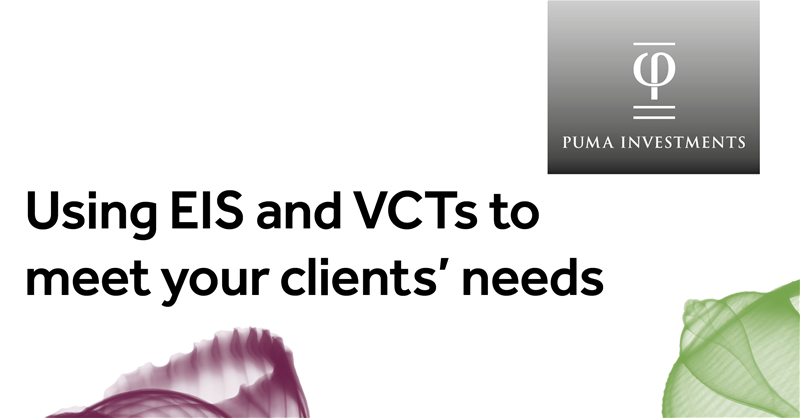EIS and VCTs can deliver a range of investment solutions – from deferring capital gains tax on a sale, diversifying investment into private companies, delivering regular tax-free income or using income tax relief to extract profit from a business tax-efficiently. Find out how they could help your clients.
Introduced by the government in the 1990s to encourage growth investment into small and medium-sized businesses (SMEs), the Enterprise Investment Scheme (EIS) and Venture Capital Trusts (VCTs) can support clients’ financial planning needs in different ways.
To attract investment into SMEs, EIS and VCTs come with some significant tax breaks. Both can offer low correlation to mainstream capital markets and could help investors save tax-efficiently for their retirement alongside pension contribution allowances.
Key features
VCTs are publicly-listed companies and investors hold shares in the trust itself, providing up to 30% annual income tax relief on a maximum investment of £200,0001, tax-free growth and tax-free dividends. Reflecting their growing popularity, 2018-19 recorded the second largest VCT fundraise to date, at £731 million.
An EIS investment is made directly into unquoted trading companies – whether a single company or a portfolio of companies managed by an investment manager. There are numerous tax incentives for taking the risk associated with investing into these businesses, including up to 30% income tax relief2, 100% capital gains tax deferral for the life of the investment, Business Relief giving 100% inheritance tax relief, tax-free growth on any gain, and loss relief where any loss made can potentially be offset against capital gains or income.
Investments need to be held for a minimum of three years, however it could take four or five years to be fully invested. Your clients should therefore be comfortable with a long-term investment horizon to enable time to invest and potential growth.

Target investment criteria
The regulatory landscape for EIS and VCTs means investors can access higher-growth companies – supporting the UK economy whilst benefitting from valuable tax reliefs and investments that can produce attractive growth or returns.
However, growth-focused investing requires effective risk management – so you should be able to assess the types of companies that qualify for EIS and VCT investment, know what managers look for and recognise investment criteria and levels of risk.
If you’d like to learn more about investing in this space, please get in touch with our business development team, who’ll be happy to tell you more. You can also read more in our longer article here.
1 To maintain the relief, shares must be held for a minimum of five years. There is also potential for tax-free dividends to be paid.
2 on up to £1 million in any tax year or £2 million if anything above £1 million is in ‘knowledge intensive’ investments.
About Puma Investments
Puma Investments offers a range of tax-efficient investments with a proven track-record of delivering for our investors and the businesses we support.
We are proud to be part of Shore Capital, a wider financial services group with a 30+ year track record of excellence, a strong balance sheet and a 160 strong multi-disciplinary team across five offices.
To date we have raised over £440 million since 2005 and, more importantly, over £130 million has been paid in dividends to shareholders. We focus on 3 core activities: Growth Capital for UK SMEs, Property Finance and Listed Equities.